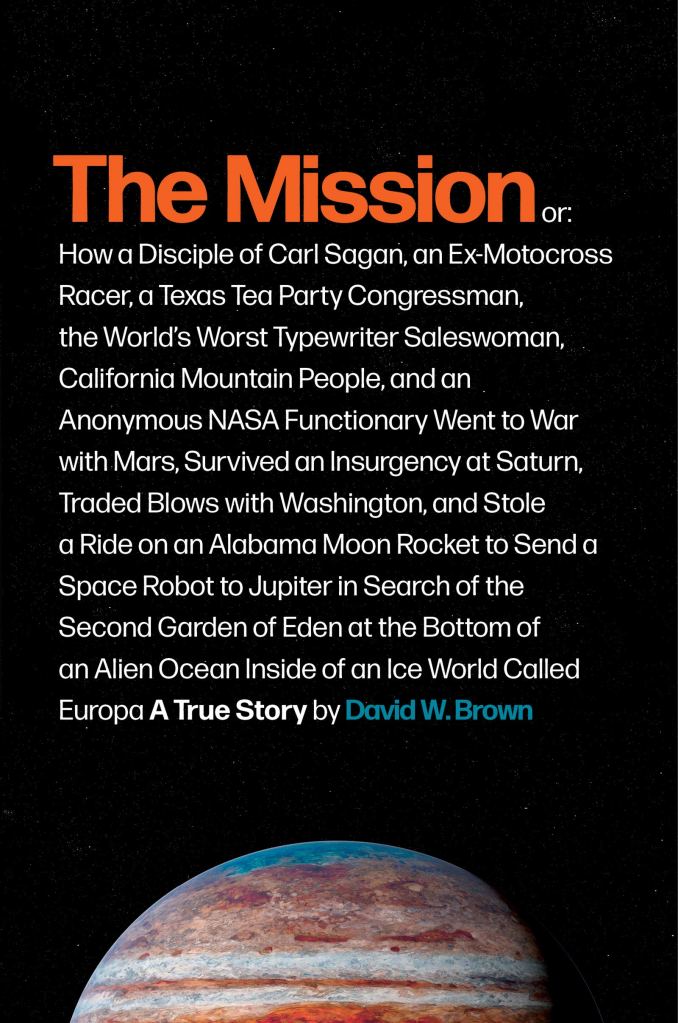
Watch enough space movies, read enough space books, whether science fact or science fiction, and there’s a moment you’ll see play out time and time again – And Then A Rocket Appears On The Pad.
Maybe it’s not a rocket. Maybe it’s a starship or a science probe. But the moment plays out the same. An incredibly complex piece of machine appears out of nowhere – machina ex deus – having and needing no origin, and then the “real story” begins.
But rockets and starships and science probes don’t appear out of nowhere. They do have origins. For every rocket that appears on a pad, there’s a story of toil and ingenuity that explains how it got there.
David W. Brown’s “The Mission” is not that story. “The Mission” is the story before that story.
Before a rocket appears on a pad, before a space probe appears in a payload fairing, before a starship appears in the stars, there is an official program, a concerted effort of the aforementioned toil and ingenuity, and multiple flavors of engineering and probably some science.
But before that official program, there’s an idea. A dream.
“The Mission” is that story. The titular Mission is a mission to Europa, a moon of Jupiter, a smallish orb of rock and water and ice that looms far larger than its physical size in the landscape of solar system science because of that water. On Earth, where there’s water, there’s life. And Europa not only has twice as much water as the pale blue dot where we live, it’s conveniently spewing that water into space, right out there for a visiting spacecraft to taste.
“The Mission” is not a story of flying a yet-unflown Europa mission, nor a story of building a yet-unbuilt yet-unflown Europa mission. It’s the story of an idea, a dream dreamt over decades to explore this strange new world, and perhaps to seek out new life in its ocean.
It is still, most definitely, a story of toil and ingenuity. It is also a very human story, and it is there that Brown elevates his subject from interesting to captivating.
As an experienced journalist, Brown has a portfolio packed with well-told space stories. He has a demonstrated knack for taking “rocket science” and not only making it accessible, not only conveying Why It Matters, but also capturing Why It’s Awesome, finding amidst the data the things that stir souls.
That talent is brought fully to bear in “The Mission,” and impressively so – it’s one thing to bring that level of creativity to short-form non-fiction, but here Brown sprints a marathon, maintaining the same engaging style over hundreds of pages he delivers on the first.
The heart of “The Mission,” however, is a very human heart. It’s a story laden with science spacecraft and alien worlds and trajectory comparisons, but it’s a story about people. Brown’s tapestry here weaves the story of its Europa mission through the lives of the people who have touched, and been touched by, the dream of that mission, interlacing space science with chicken farms and car wrecks and former NSYNC member Lance Bass.
At the end of “The Mission” the call of Europa is still calling. Its mysteries are still mysterious. But Brown has pulled back the veil on another little-seen world – a world of men and women with dogged determination to clad a dream in metal and propel it toward the stars.
Filed under: Reviews, space | Tagged: Clipper, David W Brown, europa, JPL, Jupiter, NASA, science, space, The Mission | Leave a comment »









 Well, last year, I was contacted by someone from Hubbell Power Systems, which now owns AB Chance, which is still around, and still makes lineman’s tools. And this story has been part of their corporate mythology for almost half a century, but they didn’t have the NASA side of the story until they stumbled across my book. And now they wanted to make a documentary. So they did.
Well, last year, I was contacted by someone from Hubbell Power Systems, which now owns AB Chance, which is still around, and still makes lineman’s tools. And this story has been part of their corporate mythology for almost half a century, but they didn’t have the NASA side of the story until they stumbled across my book. And now they wanted to make a documentary. So they did.







 About Bromleigh McCleneghan
About Bromleigh McCleneghan